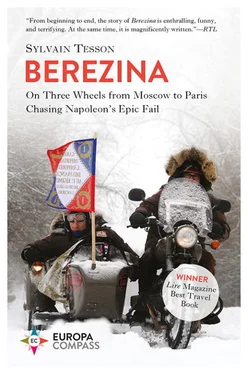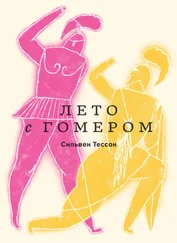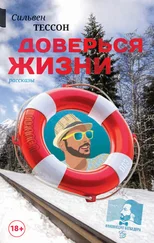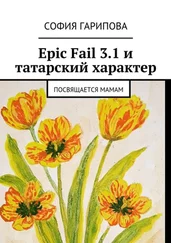“Do you have any complaints?” I said.
“Are you becoming precious?” Goisque said.
“Buzz off,” Gras said.
After crossing the Berezina, Napoleon could consider himself lucky, since he had escaped annihilation, saved his own skin, his marshals, and what could be called his army, down to two thousand officers, less than twenty thousand men, and forty thousand survivors in no condition to fight. “You see how one can pass right under the enemy’s nose?” he kept telling his close entourage.
From a strictly numerical point of view, just like at Borodino, the Russians had lost more men than the French.
From a tactical point of view, Napoleon had duped the enemy. The trick had been a slap in the face, an insolent disavowal. It underlined flaws in the Russian command. If Kutuzov and Tchitchagov had delayed launching their assaults, it was because they still feared the proletarian king. Neither of them wanted a full-frontal conflict with him. Napoleon continued to advance, crowned with “the capital gathered for many years,” von Clausewitz writes. Russians still saw this man at bay, reduced to walking while leaning on a stick, as the unvanquished sovereign. Napoleon’s power lay in his reputation. His former glory was his caparison.
From a human point of view, the soldiers of the Empire had made a supernatural effort. Drained of blood, the Grande Armée had gained a victory. Nevertheless, collective French memory remembered only the horror of the carnage. The name of this geographically insignificant waterway passed into History and current French language usage and acquired the meaning we know. If we’d stuck to the pure reality of facts, “it’s a Berezina,” in French, should have meant, “we made it by a whisker, guys, we felt it fly right by us, we got our fingers burned, but life goes on and stuff the Queen of England.”
The ordeal of the Emperor, accompanied by his ghosts, continued toward Vilnius, through Zembin, Pleshnitzy and Ilya. A rear guard of three thousand men was formed under the command of Ney. “Two or three days later,” Labaume writes, “it was so reduced that we wondered where the rear guard was even when we were with it.” Kutuzov was still hot on French heels. And the French kept melting like butter in the sun. The shame of having allowed the enemy to escape the mousetrap hurt Russian pride. As Caulaincourt puts it, Platov’s Cossacks, “tired of killing,” harried the stragglers and robbed them before leaving them to die stark naked in the woods. Forests and swamps rolled by, larded with frozen streams. One day, the Grande Armée got involved in a system of footbridges that crossed ruts. Caulaincourt was surprised by the enemy’s lack of initiative. “Six Cossacks with torches would have been sufficient to deprive us of this means of retreat.” Kutuzov’s hesitation, Tchitchagov’s errors, Wittgenstein’s slowness: the Russians seemed to be laying pearls of incompetence at the feet of Napoleon. The French could burn candles for their enemy.
They had not finished descending into hell. For them, hell was paved with ice. They were yet to experience the harshest cold of the countryside. As the wind and the snow tormented us on the bikes and sidecars, I thought of these soldiers wandering about at -22°F. Flocks of crows were circling over their troops. Semi-wild dogs were fighting over corpses, getting braver as the men were growing more exhausted. The temperature was constantly dropping in this early December of 1812.
Once, Goisque and I had spent some time in the Sakha Republic, in January, to experience extreme temperatures. Breathing was a chore, and ice particles would stick to mucous membranes. We had an evening at -54°F and some guys had said to us, “A bit more of this and the tires will become square.” From that time, I’d kept the memory of a constant struggle against the cold, which left us exhausted in the evening. And yet we, we slept every night in a warm room after being well fed and watered with tea!
The cold killed the weakest and drove the others insane. Limbs would snap like glass. There were soldiers who wrapped their feet “in the skins of freshly-skinned horses,” Labaume writes. The bivouac fires punctuating the road were a temptation. Caulaincourt knew that “As soon as these wretches would fall asleep, they were dead.” Still, thinking they had been saved after crossing the Berezina, they had all regained a little hope. Only to fall like flies on the road to Vilnius. I remembered these accounts and said to myself that hope is a terrible impostor, a wait that makes you suffer a little more than disappointment. The only thing the walkers didn’t need to fear was getting lost. “The number of men who fell never to get up again acted as a guide,” Bourgogne writes. How sorry he must have been to have given away his bearskin by the Berezina.
On December 3rd, in Molodechno, the Emperor drafted the 29th bulletin , which was addressed to French subjects. This text passed on to posterity. In it, Napoleon admitted to the disaster with a generous helping of euphemisms. He underlined Ney’s glorious behavior, the merit of his soldiers, the annihilation of his cavalry, the joyous indifference of the best elements in his army in the face of adversity, and the villainy of the Cossacks, “that contemptible cavalry that only makes noise but is incapable of taking on a company of light infantrymen.” The bulletin ended as follows: “The Emperor’s health has never been better,” which Napoleon’s critics considered proof of his egotistical folly, not seeing that the Emperor considered his body and that of France as one.
We were gaining miles toward Lithuania. Night had fallen. Driving constituted avoiding being blinded by passing trucks. Puzzled by the dimness of our lights, they would turn up their headlights in full. Goisque slammed on the brakes, skidded, stalled, and narrowly avoided being hit by Vitaly’s bike, which was close behind us.
“What the fuck are you doing, pal?”
“The sign, you bunch of blind men!” Goisque replied. “We’re in Smorgon! In Smorgon!”
On December 5th, Napoleon arrived in Smorgon with his military staff. Two days earlier, he had told Caulaincourt, “In the current state of affairs, I can command Europe only from the Palais des Tuileries.” This meant that he had decided to go back to Paris and leave the debris of his army behind. This idea had germinated since the day when, shortly after stopping at Dorogobouj, in early November, he had learned of the coup by Malet. This obscure general, interned for mental illness, had left his Paris convalescent home and tried to overturn the Empire on October 22nd. The putsch had failed but the Emperor had been as shaken by this news as by the announcement of the number of losses against the Russians on that day. There he was, harried by Kutuzov’s army and increasingly threatened at the heart of his power. He told Caulaincourt, “The French are like women, you mustn’t leave them for too long.” From that moment on, he’d vowed to return to France as soon as possible in order to take the Empire back in hand.
Under the snow, in the middle of the night, we had to obey Goisque, who had decided to snap away at the Smorgon sign, with all three bikes in line at the foot of it. The flash sent its absurd glow onto the curtain of flakes.
Here, a few steps from Vilnius, Napoleon judged the moment to be favorable. Leaving the army in the hands of Murat (“Your turn, King of Naples,” he had said by way of passing on the command), he left at 10 P.M., in a sleeper hitched to six horses. He took Caulaincourt with him, escorted by a detachment of the Guard that split up along the versts. Together, at top speed, they were going to return to Paris through Poland and Germany, burning stages like bats out of hell, writing the pages of one of History’s strangest journeys, combined with a session of intimate confidences conducted at 4°F in the wild forest snow. It was now no longer about saving the army, but taking back the reins of the Empire, which had been dropped six months earlier.
Читать дальше












